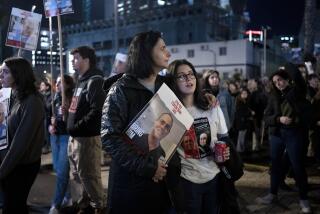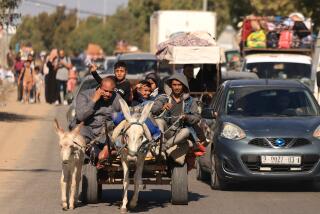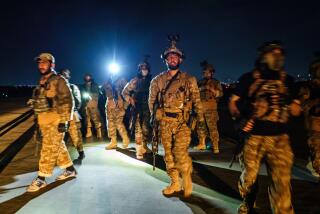Forces Gather as Bush Issues Stern Warning
- Share via
WASHINGTON — As Taliban antiaircraft fire shook the capital of Afghanistan, President Bush in remarks Saturday edged closer to war, telling the Afghan regime that “full warning has been given and time is running out.”
With preparations for a military campaign building and allied pledges of support in hand, Bush asserted that other nations “must stand with the terrorists or stand with the civilized world.” In his weekly radio address, the president also made it clear that he again was rejecting a Taliban offer to begin negotiations in exchange for an end to the U.S. threat of retaliation.
Bush’s comments came amid a flurry of developments suggesting that the military and diplomatic arrangements needed before any warfare begins may now be in place, nearly a month after the Sept. 11 terrorist attacks on the World Trade Center and the Pentagon.
After separate trips to the Middle East and Central Asia for consultations, Defense Secretary Donald H. Rumsfeld and British Prime Minister Tony Blair each returned home Saturday. Officials of Saudi Arabia, Oman, Pakistan, Uzbekistan and Turkey have signaled in recent days that they would cooperate with the United States in the gathering military mission.
Though none of those countries said it would allow U.S. attack aircraft to be launched from its soil, each made clear that it would provide U.S. forces at least the minimum assistance necessary to strike the fundamentalist Taliban regime and the prime suspect in the terrorist attacks, Osama bin Laden, U.S. officials said. That assistance will include overflight rights and at least limited permission to base some troops and aircraft in those countries.
The most visible sign of that support was the continuing arrival in Uzbekistan of light infantry from the Army’s 10th Mountain Division. The troops have permission to provide security and conduct search-and-rescue operations, but Uzbek officials have hinted that they may be allowed a broader mission as well.
Monday, 23,000 U.S. troops are expected to begin allied military exercises in Egypt; some of those personnel could be diverted to combat duty or support operations if a campaign against Afghanistan begins, officials said.
Meanwhile, officials of the Northern Alliance, which is fighting the Taliban in Afghanistan, said they expect U.S. strikes in the coming days and are poised to launch an attack against Taliban positions.
The alliance, also known as the United Front, has been bolstered by recent deliveries of tanks and military hardware from Russia.
In his remarks, Bush declared that the enemy is “the terrorists themselves, and the regimes that shelter and sustain them. The Taliban has been given the opportunity to surrender all the terrorists in Afghanistan and to close down their camps and operations.”
For those countries that support terrorism, there will be “a heavy price,” he warned.
To help strengthen the support of Muslim nations, Bush emphasized that the campaign was not aimed at anyone of Islamic faith, or at the Afghan people.
“America is determined to oppose the state sponsors of terror. Yet we are equally determined to respect and help the men and women those regimes oppress,” the president said.
He also stressed that the United States intends to give long-term aid to the Afghans, including help in rebuilding a country that has been at war for 20 years and in the grip of famine for two.
Bush said the United States long has been the largest source of humanitarian assistance to Afghanistan, and he pointed out that just last week he announced an additional $320 million in aid to the Afghan people.
“Despite efforts by the Taliban to disrupt these critical aid shipments, we will deliver food and seeds, vaccines and medicines by truck and even by draft animals,” Bush said. Some supplies will be air-dropped--”conditions permitting,” he cautioned.
In the Afghan capital of Kabul on Saturday, Taliban antiaircraft guns opened fire on a slow-moving aircraft, possibly an unmanned U.S. reconnaissance drone, as it crossed the partly cloudy sky. News agencies there reported that three gun positions fired continuously for nearly 25 minutes without hitting the aircraft.
Residents of Kabul, the agencies reported, watched the intense volleys from streets and rooftops in the battle-scarred capital.
Rear Adm. Craig Quigley, a senior Pentagon spokesman, said he could not offer information concerning the aircraft, but said that, judging from news footage, the high-flying silver plane “looked more like an airliner to me.”
Rumsfeld has confirmed that the U.S. is flying reconnaissance drones over Afghanistan. The craft are used to photograph and map possible military targets.
By firing at them, the Afghan gunners may have revealed information about their own radar and gun positions that could be useful to the U.S. military in the event of an air attack.
Sept. 22, the Taliban claimed to have shot down one of the aircraft over the Tashkurgan Pass in Afghanistan’s northern Samangan Province.
Rumsfeld acknowledged that the United States had lost contact with an unmanned drone but said officials had no reason to believe it had been shot down.
In the Salang Gorge of Afghanistan, Northern Alliance commander Gen. Abdul Basir said Saturday that, after any U.S. airstrikes, alliance forces would push forward and “clear the area.”
“If we get an order, it will take us an hour to be fully combat ready. Our fighters are local people. They’re ready and equipped.”
The Northern Alliance is predominantly made up of minority Tajik and Hazara tribal fighters. As the international crisis has mounted, the opposition forces have expanded the sliver of territory they control in the northeast Panjshir Valley.
The goal of the opposition forces is to capture the key northern city of Mazar-i-Sharif before the onset of winter. During the five-year civil war since the Taliban took power, control of Mazar-i-Sharif has changed hands several times.
Basir said the Taliban has reinforced its positions north of Kabul and has built a second line of defense, which he conceded could complicate a Northern Alliance attack on the Taliban.
Northern Alliance officials claim to be in touch with a dozen Taliban commanders they hope will switch sides if an attack comes.
“From Meydan Shahr to Jalalabad, we count on 10 commanders in touch with us who could raise 15,000 men,” Basir said. “We know them, and in their hearts, they’re not with the Taliban. If America starts a military action against Osama bin Laden, they will definitely join our ranks.”
Meydan Shahr is 25 miles southwest of Kabul, and Jalalabad is 80 miles east of the capital.
Meanwhile, officials of the Taliban government offered Saturday to release captive foreign aid workers if the United States stopped “issuing threats.” The regime claims a “massive propaganda campaign” by the U.S. is driving people from their homes and creating waves of refugees headed toward the borders and into rebel-held territory.
In a communique released to news agencies in Kabul, the Taliban Foreign Ministry said that if Washington issues “a statement that the [Afghan] people will be safe and will not be the target of attack,” then it would free the eight aid workers accused of promoting Christianity. The captives include four Germans, two Americans and two Australians. They were imprisoned by Taliban authorities in August.
The proposal immediately was rejected by the Bush administration.
“The president has made clear from the beginning that the Taliban needs to release the aid workers and that it is time for action, not negotiation,” White House spokeswoman Claire Buchan said.
As the U.S.-led coalition has increased military and political pressure on Kabul, the Taliban regime has issued a series of such offers, apparently hoping to negotiate over U.S. demands that it turn over suspected terrorist leader Bin Laden, who is believed to be in hiding inside Afghanistan. The Bush administration says Bin Laden’s release is not negotiable.
Also Saturday, the Taliban ambassador to Pakistan said that reclusive leader Mullah Mohammed Omar had decided to release a British journalist captured Sept. 28 near the western city of Kandahar after she entered the country disguised in a burka, the head-to-toe garment the fundamentalists require women to wear.
Ambassador Abdul Salam Zaeef said plans to release Yvonne Ridley, 43, were based on humanitarian considerations after appeals by British and Pakistani diplomats.
Elswhere, the Taliban said today they were deploying 8,000 more fighters along the border with Uzbekistan, a Pakistan-based Afghan news agency reported.
Quoting unnamed Taliban defence ministry sources, the Afghan Islamic Press (AIP) said although there were already several thousand fighters along the border, reinforcements were needed after reports the United States was deploying its troops in Uzbekistan.
*
Richter reported from Washington and Dixon from Jabal os Saraj, Afghanistan. Times staff writers Edwin Chen in Washington and Rone Tempest in Islamabad, Pakistan, contributed to this report.
More to Read
Sign up for Essential California
The most important California stories and recommendations in your inbox every morning.
You may occasionally receive promotional content from the Los Angeles Times.














